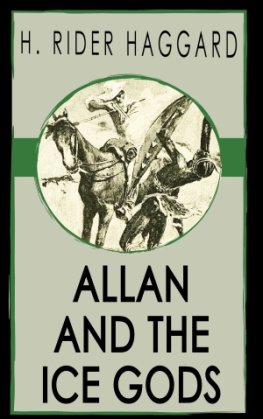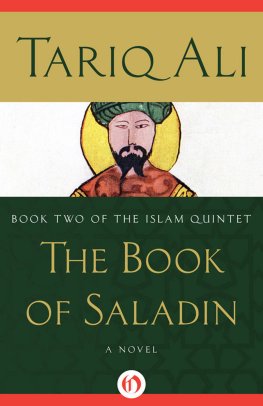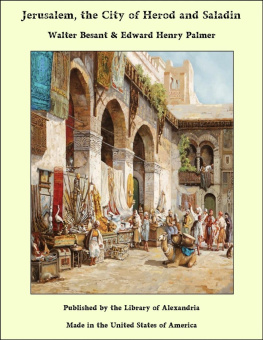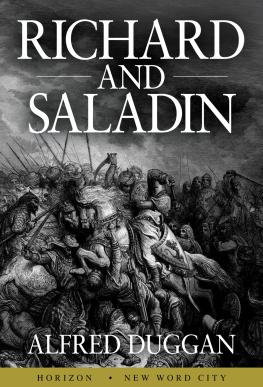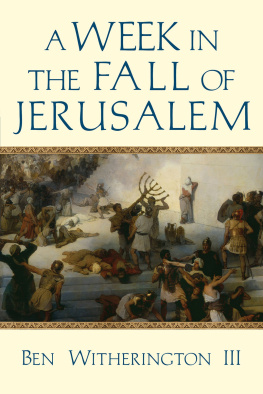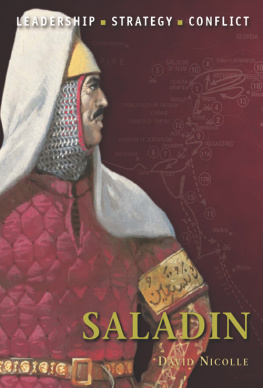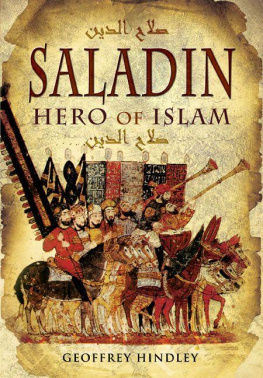Stanley Lane-Poole - Saladin and the Fall of Jerusalem
Here you can read online Stanley Lane-Poole - Saladin and the Fall of Jerusalem full text of the book (entire story) in english for free. Download pdf and epub, get meaning, cover and reviews about this ebook. publisher: Ozymandias Press, genre: Detective and thriller. Description of the work, (preface) as well as reviews are available. Best literature library LitArk.com created for fans of good reading and offers a wide selection of genres:
Romance novel
Science fiction
Adventure
Detective
Science
History
Home and family
Prose
Art
Politics
Computer
Non-fiction
Religion
Business
Children
Humor
Choose a favorite category and find really read worthwhile books. Enjoy immersion in the world of imagination, feel the emotions of the characters or learn something new for yourself, make an fascinating discovery.
- Book:Saladin and the Fall of Jerusalem
- Author:
- Publisher:Ozymandias Press
- Genre:
- Rating:5 / 5
- Favourites:Add to favourites
- Your mark:
- 100
- 1
- 2
- 3
- 4
- 5
Saladin and the Fall of Jerusalem: summary, description and annotation
We offer to read an annotation, description, summary or preface (depends on what the author of the book "Saladin and the Fall of Jerusalem" wrote himself). If you haven't found the necessary information about the book — write in the comments, we will try to find it.
Saladin and the Fall of Jerusalem — read online for free the complete book (whole text) full work
Below is the text of the book, divided by pages. System saving the place of the last page read, allows you to conveniently read the book "Saladin and the Fall of Jerusalem" online for free, without having to search again every time where you left off. Put a bookmark, and you can go to the page where you finished reading at any time.
Font size:
Interval:
Bookmark:
SALADIN IS ONE OF THE few Oriental Personages who need no introduction to English readers. Sir Walter Scott has performed that friendly office with the warmth and insight of appreciative genius. It was Saladins good fortune to attract the notice not only of the great romancer, but also of King Richard, and to this accident he partly owes the result that, instead of remaining a dry historical expression, under the Arabic style of el-Melik en-Nasir Salah-eddin Yusuf ibn Ayyub, he has become, by the abbreviated name of Saladin, that familiar and amiable companion which is called a household word. The idea, it is true, is vague and romantic. The Talisman has given us a noble portrait of the Sultan whose chivalry and generosity excited the admiration of the Crusaders, but the reader is left in uncertainty as to the history and achievements of the hero, and what he is told in those fascinating pages is not always strictly authentic. On the historical relation of the novel to which Saladin owes so much of his fame something is said at the end of this book. The present biography, the first that has been written in English, aspires to fill in, from contemporary sources, the details of the picture.
It is singular that, so far as English literature is concerned, the character and history of Saladin should have been suffered to remain where Scott left them seventy years ago, and that no complete Life of the celebrated adversary of Richard Cur de Lion should have been written in our language. The materials are abundant, even exhaustive, so far as eastern scholars understood biography. We must not expect, the personal details which delight the student of interviews: there were no illustrated papers in Saladins time. But for the essential facts of his life and the qualities of his nature we have the best possible evidence, rich in extent and faithful in detail. The writers of the two chief Arabic records had excellent opportunities of ascertaining the truth, and both were men of learning and high character. Baha-ed-din, who was only seven years younger than Saladin, though he survived him by forty, was an Arab of the celebrated tribe of Asad, born at Mosil on the Tigris in 1145. He went through the arduous course of study by which Moslems in those days qualified themselves for the judicial office of Kady. In the famous Nizamiya college at Baghdad, founded by the great Vezir Nizam-el-mulk, the friend and schoolfellow of the astronomer-poet Omar Khayyam, Baha-ed-din attended the lectures of the most distinguished professors of the day, men who had wandered, like our own medieval scholars, from university to university, from Spanish Cordova to Tatar Samarkand, teaching and learning as they went. He became a professor himself at his native city of Mosil, and his wisdom and judgment so commended him to the Atabeg or ruler of Mesopotamia that he chose him repeatedly to be his ambassador in grave political emergencies.
Baha-ed-din was at Mosil when Saladin twice laid siege to it in 1182 and 1185; he went on an embassy to Damascus in 1184, when Saladin was so much impressed by his ability that he offered him a judgeship, which was loyally declined by the envoy; but they met again at Harran in the spring of 1186, when Baha-ed-din assisted in drawing up a treaty of peace between his sovereign and Saladin. After making the pilgrimage to Mekka, and to Jerusalem, then newly recovered from the Christians, he visited the Sultan once more, and from that time forth he seldom left his side. Entering his service on 28th June, 1188, he was present throughout his subsequent campaigns, witnessed the siege of Acre from the beginning to the end, accompanied him as he harassed Richards march down the coast, took a prominent part in the engagements at Jaffa in 1192, and was at Saladins bedside during his fatal illness. After the Sultans death, he accepted the high dignity of judge of Aleppo, and there he devoted his zeal and his savings to founding colleges and training doctors to be learned in the law. One of his pupils has left a touching description of the venerable Kady, as he knew him, when a heated alcove and heavy furs could not warm the chilled blood of 85; but the old scholar still loved to teach the students who came to him after Friday prayers, when he could no longer go to the mosque, and when even in his private devotions he could scarcely keep his feet. He drooped like an unfledged bird for weakness, says his biographer, and in 1234 he died, twoscore years after the events he related in his Life of his master.
For the last five years of Saladins career, Baha-eddin is an incomparable authority, an eye-witness of what passed, and an intimate friend and counsellor of the Sultan. For the earlier periods he is less accurate and much less detailed; but even here he is able to record several important transactions at first hand, and his familiar intercourse with Saladin and his officers and kinsmen must have supplied him with much of his information. He writes, it is true, as an avowed panegyrist, but though in his eyes the King can do no wrong, he is so frank and guileless in his narrative, and so obviously writes exactly what he saw and thought, that the biography has not suffered by the writers hero-worship. It bears the unmistakable stamp of truth, and its personal bias and oriental hyperbolism are easily discounted. As our sole firsthand witness to the negotiations between Richard I. and Saladin, Baha-ed-dins simple veracity is especially a quality of importance.
If Baha-ed-din is an avowed hero-worshipper, in the other prime authority we find a useful corrective to undue admiration. Ibn-el-Athir had every political reason to decry the supplanter of his local lords, and his annals contain criticism of Saladins generalship and one or two graver accusations. Ibn-el-Athir, who was also an Arab, of the tribe of Sheyban, was fifteen years younger than Baha-ed-din, and was born in 1160 at Jezirat-ibn-Omar on the Tigris, over which city his father was Waly or prefect. The historian spent most of his life in laborious study at Mosil, where his brother was a distinguished councillor of the Atabeg who ruled Mesopotamia. Another brother held a post in Saladins chancery. Ibn-el-Athir, like Baha-ed-din, was present when Saladin besieged Mosil in 1185, and he accompanied the contingent which the Mesopotamian princes afterwards sent to join the Sultans army in his north Syrian campaign of 1188; he was also a traveller, and in his journeys to Damascus, Jerusalem, and Aleppo, he had means of verifying his information. His History of the Atabegs of Mosil, completed in 1211, is as much a panegyric as Baha-ed-dins biography of Saladin, but it is a panegyric of Saladins enemies; its author can never forgive him for supplanting the dynasty of the Atabegs in Syria, and making even the great lord of Mosil his vassal. Thus, if anything can be urged in disparagement of Saladin, we may be sure that Ibn-el-Athir will not pass it over. Yet, with this natural bias in favour of his familys old masters and benefactors, he is not usually unfair. He recognises Saladins great services to Islam, and in his later work, the Kamil, or Perfection of History, which is brought up to within three years of his death in 1233, he shows a more impartial spirit than in his special eulogy of the Atabegs of Mosil.
These two historians must be the prime authorities for a Life of Saladin; but there are others of great value for particular portions or aspects of his career. Of these Imad-ed-din of Ispahan, generally known as el-Katib, the Scribe, Saladins chief secretary or chancellor for the Syrian provinces, is of the first importance; but unfortunately only a small part of his work has been printed. He was with his master at the siege of Acre, and his writings, despite their intolerable rhetoric, have the merit of firsthand documents. The
Font size:
Interval:
Bookmark:
Similar books «Saladin and the Fall of Jerusalem»
Look at similar books to Saladin and the Fall of Jerusalem. We have selected literature similar in name and meaning in the hope of providing readers with more options to find new, interesting, not yet read works.
Discussion, reviews of the book Saladin and the Fall of Jerusalem and just readers' own opinions. Leave your comments, write what you think about the work, its meaning or the main characters. Specify what exactly you liked and what you didn't like, and why you think so.

